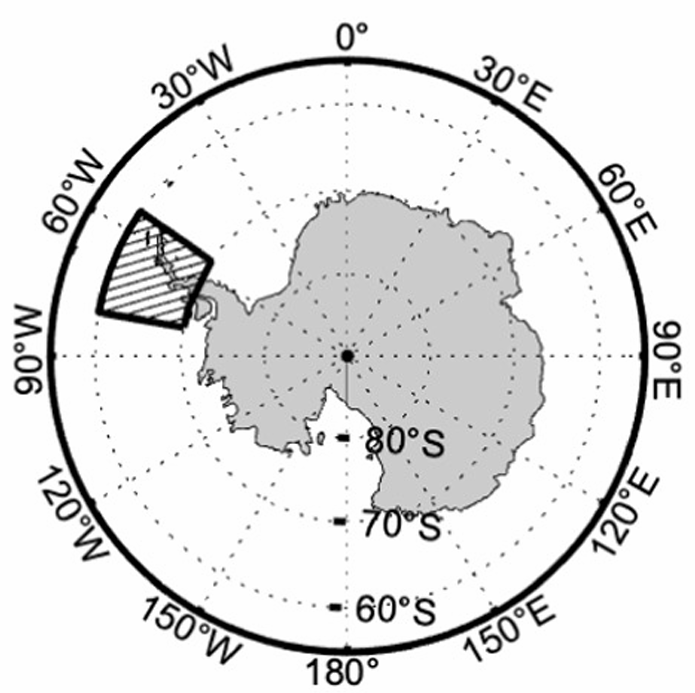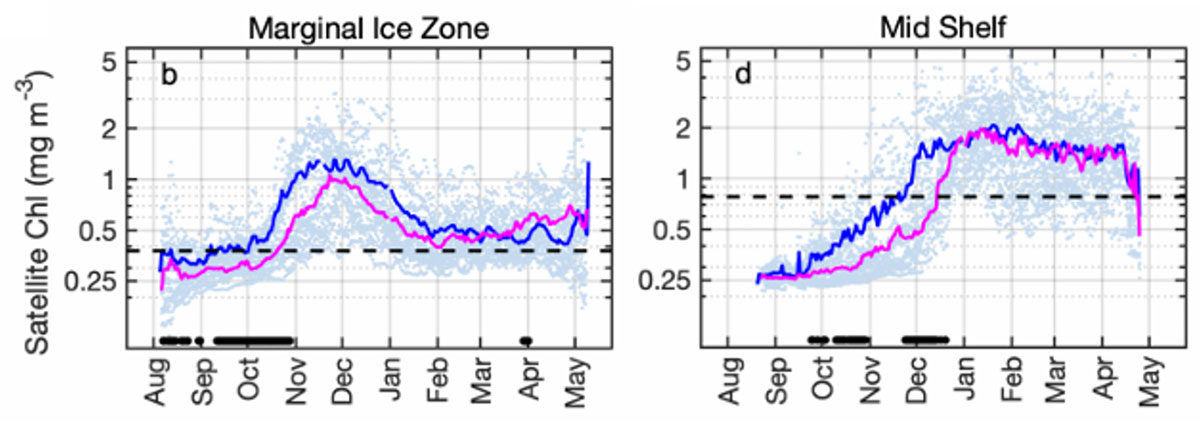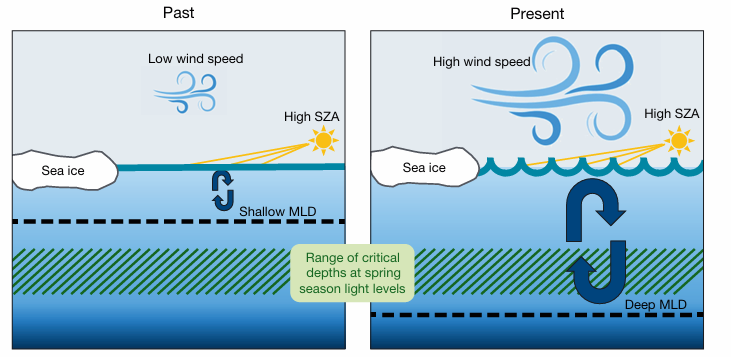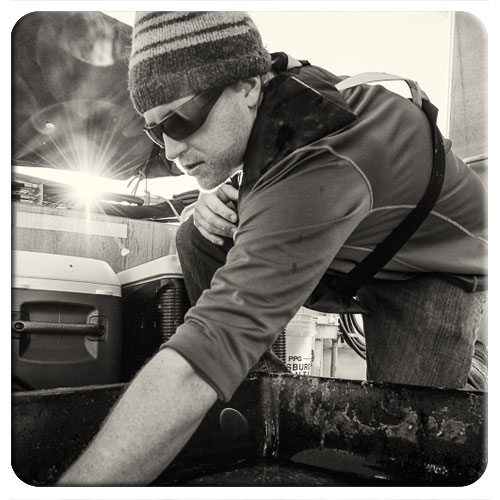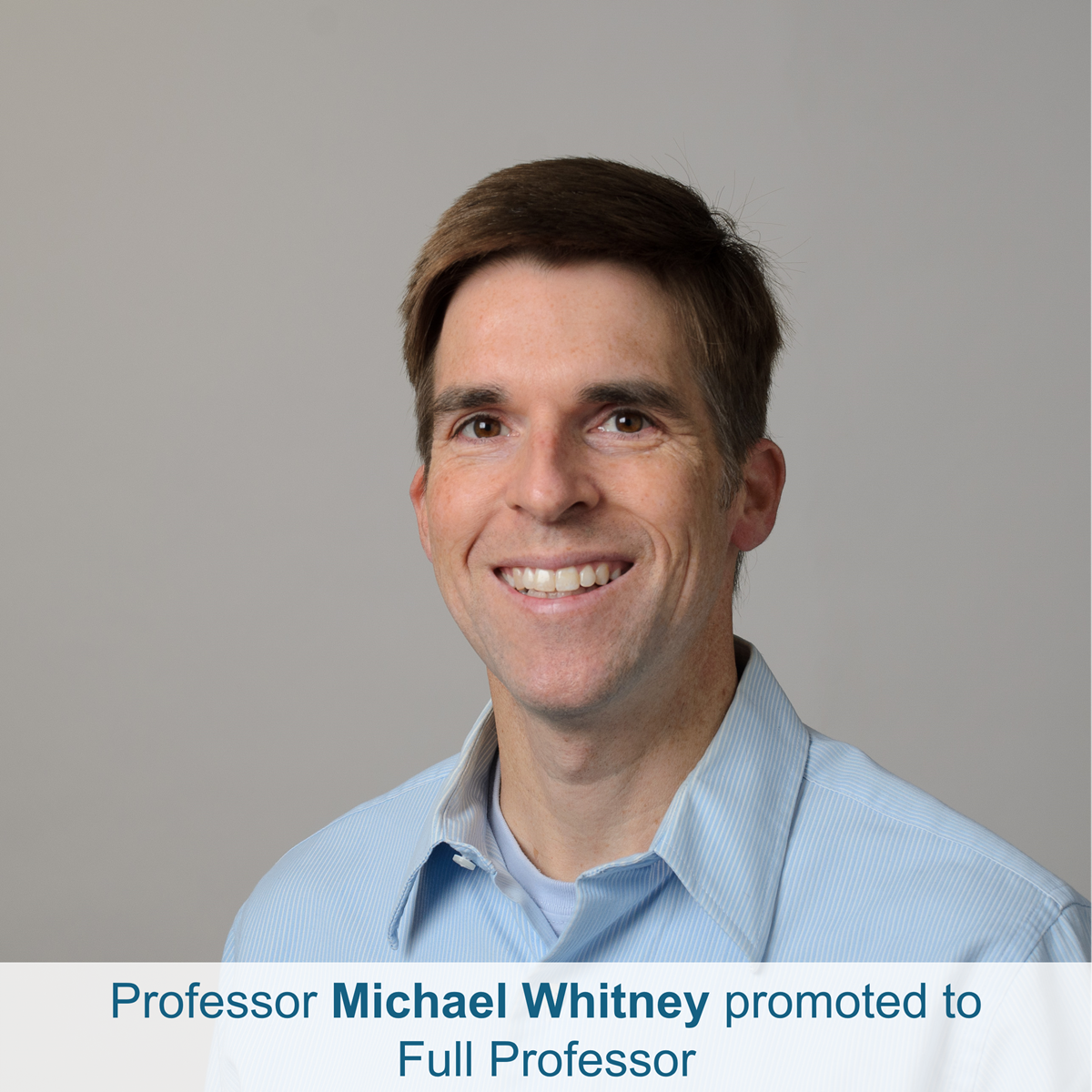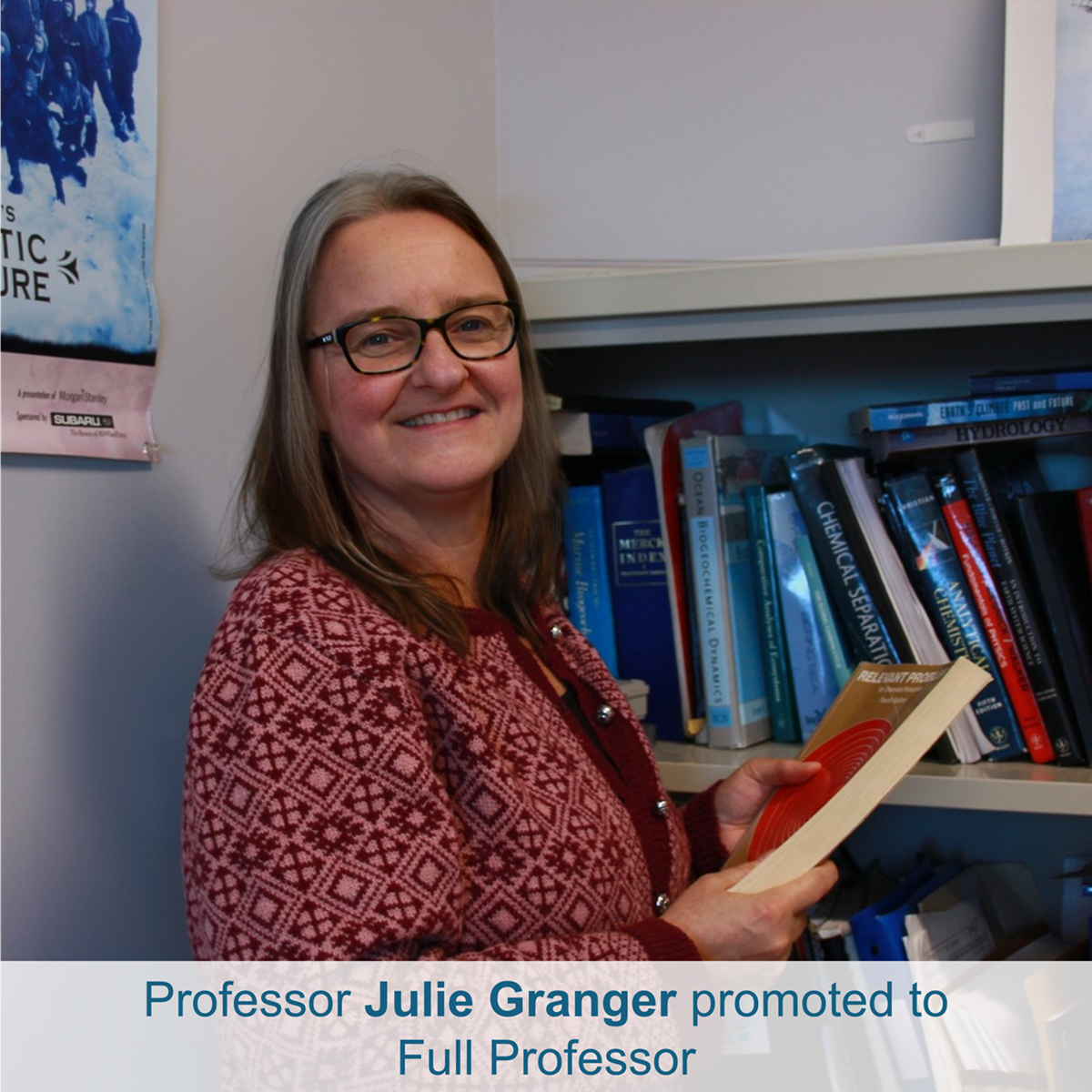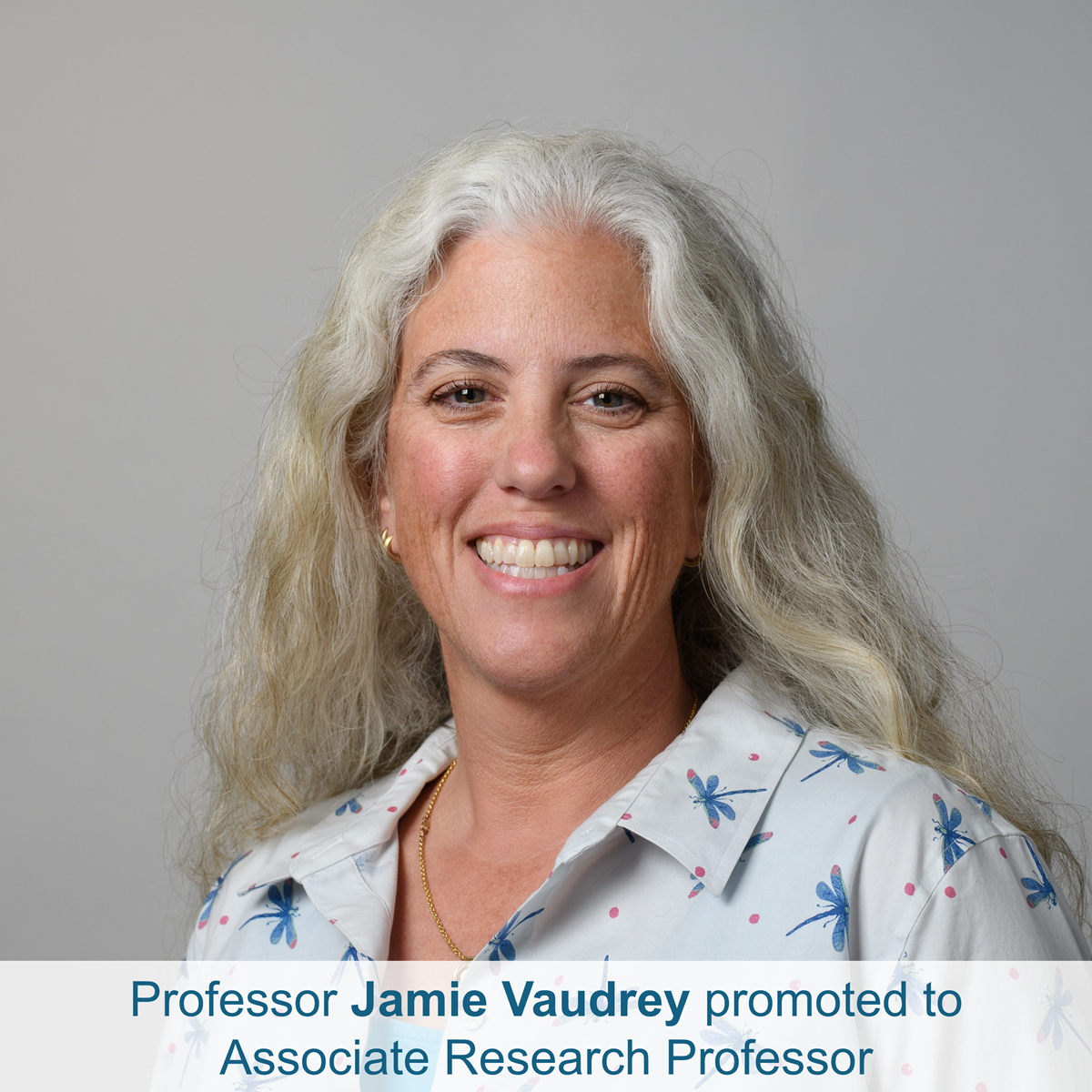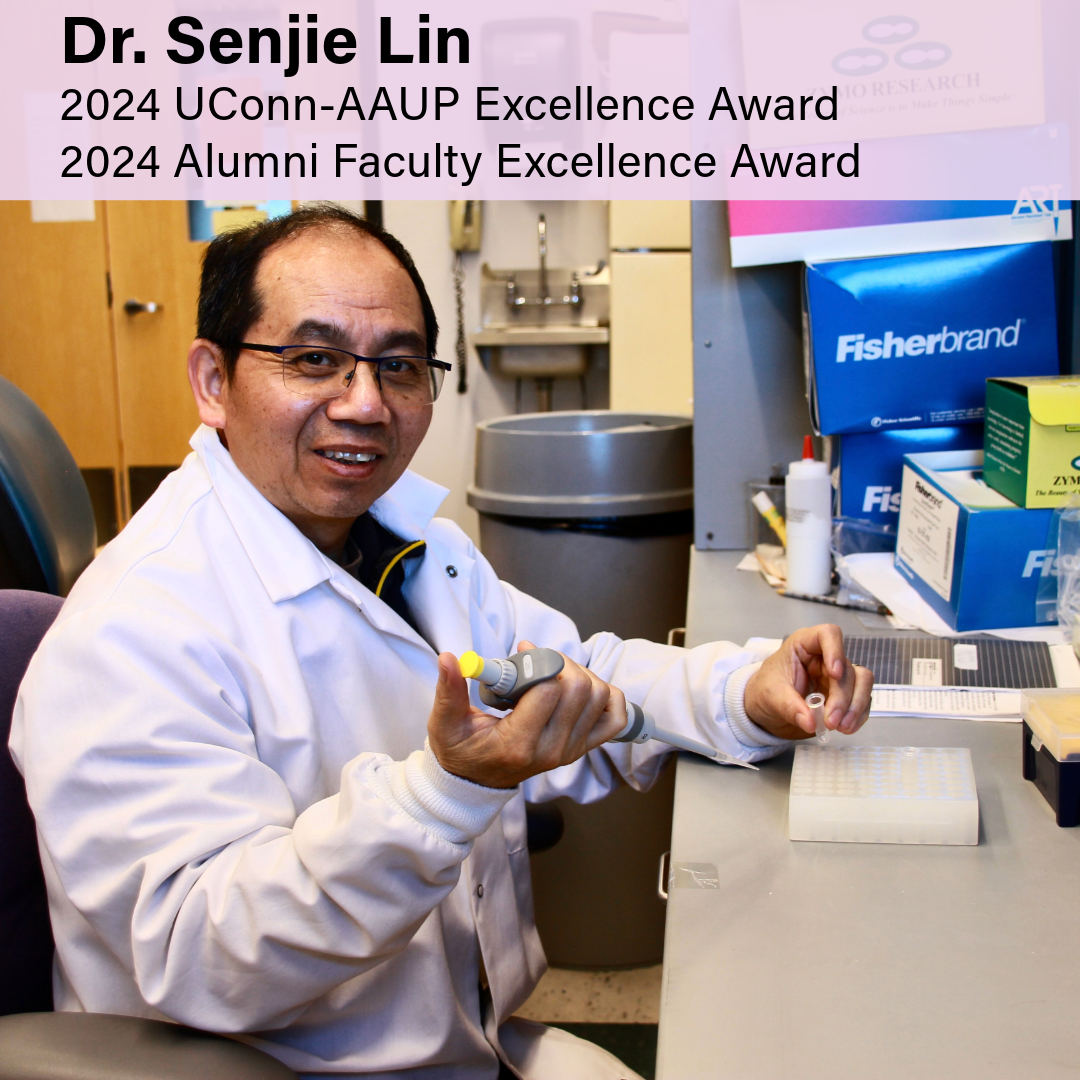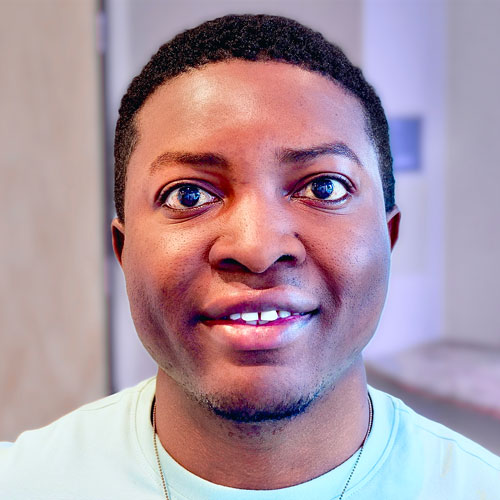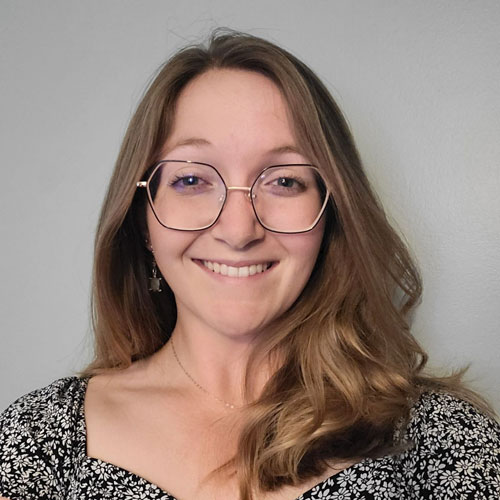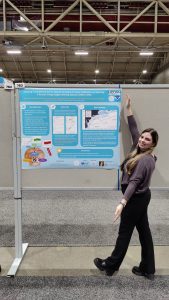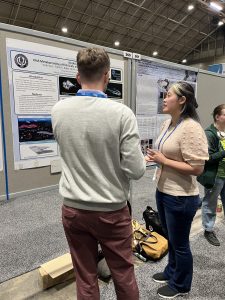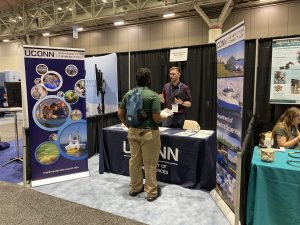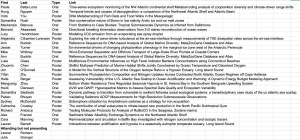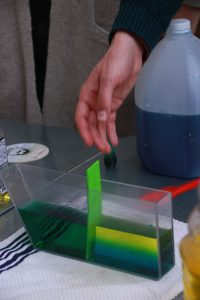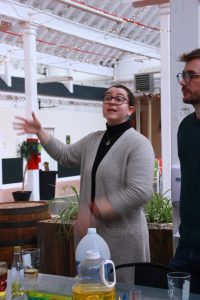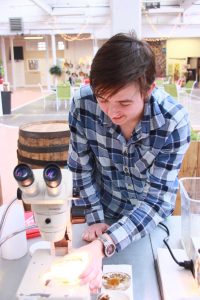Check out a summary of some of the achievements in our department in spring of 2024 below!
Publications:
*identify students
Professor Hannes Baumann and Professor Catherine Matassa:
The study reports on a long-term experiment in the Rankin Lab, where small Black sea bass were raised under different temperature and food conditions during fall and winter.
Zavell, M. D.*, Mouland, M. E. P., Matassa, C. M., Schultz, E. T., & Baumann, H. (2024). Temperature- and ration-dependent winter growth in northern-stock Black Sea Bass juveniles. Transactions of the American Fisheries Society, 153, 163–1. https://doi.org/10.1002/tafs.10452
Professor Hans Dam:
Future climate scenarios, under warmer and more acidic conditions, will increase the negative effects of the toxic phytoplankton Alexandrium catenella on non-toxic phytoplankton.
Leitão, E.*, Castellanos, D. F., Park, G., & Dam, H. G. (2024). Antagonistic interactions of the dinoflagellate Alexandrium catenella under simultaneous warming and acidification. Harmful Algae, 102625. https://www.sciencedirect.com/science/article/abs/pii/S1568988324000593
Professor Heidi Dierssen:
Contrary to global model predictions, satellite data reveal that the timing of the spring start date and summer peak date of phytoplankton blooms have shifted later over the last two decades in the marginal ice zone west of the Antarctic Peninsula. Jessie Turner, postdoctoral associate in the Department of Marine Sciences led this effort.
Turner JS, Dierssen H, Schofield O, Kim HH, Stammerjohn S, Munro DR, Kavanaugh M (2024) Changing phytoplankton phenology in the marginal ice zone west of the Antarctic Peninsula. Mar Ecol Prog Ser 734:1-21. https://doi.org/10.3354/meps14567
Professor Senjie Lin and Research Faculty Huan Zhang:
This commentary highlights the recent development in research using cryo-electron microscopy, a cutting-edge technology, to characterize the architecture of photosystem I in dinoflagellates revealing previously unknown components. The piece then raises questions for future research to completely reconstruct the system and understand how dinoflagellates adapt to variable light conditions, thriving to form harmful algal blooms or supporting the highly biodiverse and productive coral reefs.
Lin, S., Wu, S., He, J. et al. Shining light on dinoflagellate photosystem I. Nat Commun 15, 3337 (2024). https://doi.org/10.1038/s41467-024-47797-1
https://www.nature.com/articles/s41467-024-47797-1
Graduate students in the Molecular Approaches to Oceanography course taught by Lin and Huan analyzed samples collected from the Long Island Sound Water Quality Monitoring Program. The work revealed a spatial and temporal distribution of the proton pump rhodopsin in Long Island Sound inversely related to phosphate concentration, suggesting the potential of this “novel” energy harvesting system to help dinoflagellates cope with phosphate limitation.
Zhang, H.; Nulick, K.J.; Burris, Z.; Pierce, M.; Ma, M.; Lin, S. Dinoflagellate Proton-Pump Rhodopsin Genes in Long Island Sound: Diversity and Spatiotemporal Distribution. Microorganisms 2024, 12, 628. https://doi.org/10.3390/microorganisms12030628
Professor David Lund:
The paper by Shub et al. shows that deep ocean stratification in the Atlantic is not a primary control on atmospheric CO2 over long timescales, which was one of the primary hypotheses to explain glacial-interglacial CO2 cycles. Instead, factors such as changes in biological productivity, sea ice extent, and ventilation of the Pacific must play predominant roles.
Shub, A. B.*, Lund, D. C., Oppo, D. W., & Garity, M. L.* (2024). Brazil Margin stable isotope profiles for the last glacial cycle: Implications for watermass geometry and oceanic carbon storage. Paleoceanography and Paleoclimatology, 39, e2023PA004635. https://doi.org/10.1029/2023PA004635
Professor Rob Mason:
Sediment cores were spiked with mercury isotopes to examine mercury methylation in sediments and its transfer into the water column and phytoplankton. The lead author, Kati Gosnell, was a former student, and the work was from her thesis.
Gosnell, K.*, Mazrui, N., Mason, R.P. 2024. Properties Influencing Algae Uptake of Mercury and Methylmercury from Estuarine Sediments. Environ. Poll. 346: Art. # 123604.
Professor Rob Mason, Research Faculty Sandy Shumway and Zofia Baumann:
Hansen, G.*, Shumway, S.E., Mason, R.P., & Z. Baumann. A Comparative Study of Mercury Bioaccumulation in Bivalve Molluscs from a Shallow Estuarine Embayment. Arch Environ Contam Toxicol 86, 262–273 (2024). https://doi.org/10.1007/s00244-024-01058-w
Professor Samantha Siedlecki and Research Scientist Zhuomin Chen:
Combining ocean predictions with a physiological understanding through the metabolic index yields the ability to forecast habitat multiple years into the future for a wide variety of marine organisms. In addition, widespread subsurface predictability for temperature and oxygen is also identified.
Chen, Z., Siedlecki, S., Long, M., Petrik, C.M., Stock, C.A., and C.A. Deutsch. Skillful multiyear prediction of marine habitat shifts jointly constrained by ocean temperature and dissolved oxygen. Nat Commun 15, 900 (2024). https://doi.org/10.1038/s41467-024-45016-5
Professor Pieter Visscher:
Viruses are generally associated with health issues, but actually play an important role in natural systems, where they regulate population sizes of their hosts and are involved in nutrient and element cycling. The size of most viruses ranges from 40 to 100 nanometer, which makes them difficult to detect. Consequently, their role in many ecosystems remains elusive. In the Bellanger et al. paper, we describe a novel method that makes enumeration of viruses in aquatic environments straightforward and inexpensive. With this, their ecological role can be easily assessed in freshwater, marine and hypersaline systems. As an example, we found that the viruses in Great Salt Lake, Utah, weigh about five pounds and fit in a gallon container.
Bellanger, M., P.T. Visscher, R.A. White III. 2023. Viral enumeration using cost-effective wet-mount epifluorescence microscopy for aquatic ecosystems and modern microbialites. Applied Environmental Microbiology, doi:10.1128/aem.01744-23.
Professor Evan Ward:
The gene expression profile of the microbial community inhabiting the gut of the blue mussel was analyzed to reveal a dominance of energy-related genes.
Griffin, T.W., Nigro, L.M., Collins, H.I.*, Holohan, B.A., & Ward, J.E. (2024). The metatranscriptome of resident microbiota in the gut of blue mussels, Mytilus edulis, under standard laboratory conditions. Current Research in Biotechnology 7, 100208. https://doi.org/10.1016/j.crbiot.2024.100208
Professor Michael Whitney:
Whitney, M. M., Spicer, P., MacDonald, D. G., Huguenard, K. D., Cole, K. L., Jia, Y., & Delatolas, N. (2024). Mixing of the Connecticut River plume during ambient flood tides: Spatial heterogeneity and contributions of bottom-generated and interfacial mixing. Journal of Geophysical Research: Oceans, 129, e2023JC020423. https://doi.org/10.1029/2023JC020423
Awards:
Professor Senjie Lin was awarded the Excellence in research and creativity career award by AAUP
Research Faculty Sandy Shumway was awarded the Distinguished Lifetime Achievement Award by the US Aquaculture Society and is the first female to receive the award.
Research Faculty Sandy Shumway was appointed Fellow of the Marine Biological Association, FMBA. MBA Fellows are senior practitioners in marine biology who have contributed to the discipline at the highest level and the title of Fellow of the Marine Biological Association, FMBA, was first awarded in 2014, following granting of a Royal Charter to the Marine Biological Association. The status of Fellow of the MBA is awarded in recognition of distinguished and long-term contributions to marine biology at the highest level. There are currently 50 MBA Fellows.
Graduate student Hannah Collins who received the R. LeRoy Creswell Award for Outreach and Education. This award is presented to a student of the National Shellfisheries Association who has shown exceptional merit in outreach activities.
Graduate students won awards at the recent annual meeting of the National Shellfisheries Association:
- Gordon Gunter Outstanding Poster Presentation Award Winner: Max Zavell from the University of Connecticut for his poster entitled “An estimate of carbon storage capabilities of wild and cultured shellfish in the northwest Atlantic and their potential inclusion in a carbon economy.”
- Joint winners of the Thurlow C. Nelson Outstanding Oral Presentation: Kayla Mladinich Poole from the University of Connecticut for her oral presentation entitled “Investigating suspension-feeding invertebrates as bioindicators of microplastics.”
Grants:
Professor Hannes Baumann and Associate Research Professor Zofia Baumann
Baumann, H., Baumann Z. Wiley, D., Therkildsen, N.O., Murray, C.S. ORCC: Collaborative Research: Mechanisms underpinning the unusual, high CO2 sensitivity of sand lances, key forage fishes on the Northwest Atlantic Shelf. NSF-ORCC #2307813, 8/15/23 – 7/14/2026, $1,050,000
UConn faculty with colleagues from Woods Hole and Cornell University will use molecular techniques to further understand why sand lances are so unusually sensitive to ocean acidification.
Associate Research Professor Zofia Baumann:
Z. Baumann (UConn), H. Sosik (WHOI), C. Mouw (URI), M. Lomas (Bigelow) ”Collaborative Research: A Novel Approach to Study Monomethylmercury on Natural Phytoplankton Assemblages” NSF grant (3 years: 2024-2027; Total: $1,876.706, UConn portion: $808,280)
This UConn-led research will investigate methylmercury in phytoplankton from the shelf waters and estuaries of the North Atlantic Ocean because the entrainment of this toxic pollutant into phytoplankton drives the extremely high concentrations in apex predators such as sharks tunas in this economically important ecosystem.
Professor David Lund:
Faculty member Dave Lund, in collaboration with scientists at USC and Oregon State, was recently awarded an NSF grant for $850,000 to understand the ocean’s role in carbon storage during the last ice age. The funded proposal, which will include a coring cruise to the Philippines, is entitled: Collaborative Research – Resolving the LGM Ventilation Age Conundrum: New Radiocarbon Records from High Sedimentation Rate Sites in the Deep Western Pacific
Professor Cara Manning and Professor Craig Tobias
They were awarded a $550k grant from NSF Chemical Oceanography titled “Unlocking the noble gas toolbox to quantify rates of denitrification and nitrogen fixation in marine systems.” This project will involve the application of noble gas measurements (Ne, Ar, and Kr) to quantify whether different types of coastal ecosystems are net sources or sinks of nitrogen-based nutrients. PhD student Kelsey Ward and Research Technician Peter Ruffino are working on this grant.
Professor Rob Mason:
Brandt, J. and Mason, R.P. Mercury in Eastern oysters and consumption-based risk assessment. USDA Capacity grant (Hatch). 10/1/2024-9/30/2026, $60,000
Professor Catherine Matassa and Professor Samantha Siedlecki
Matassa lab was awarded $1,411,088 by NOAA Fisheries’ Research Set Aside Program to identify where and when biotic and abiotic stressors are most and least likely to affect the scallop resource using a combination of high-resolution climate model outputs and analysis of a spatially and temporally extensive sea scallop shell archive, in conjunction with existing predator assemblage and bottom type datasets.
Project title: Combining ocean models and historical shell archives to quantify and project spatiotemporal changes in Atlantic Sea Scallop functional traits (2-year grant)
More information here: https://www.fisheries.noaa.gov/new-england-mid-atlantic/science-data/2024-sea-scallop-research-set-aside-projects-selected
